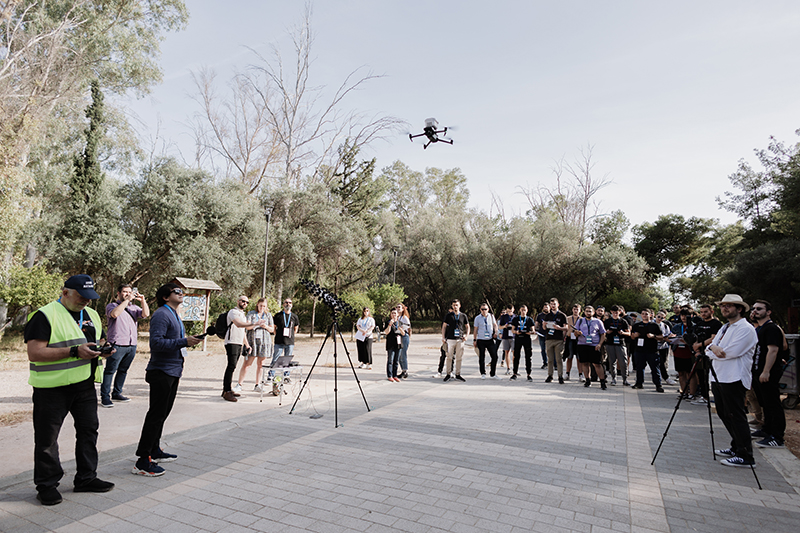The SESAR JU ImAFUSA project recently organised an open day in May 2024 in Athens, Greece, to carry out a psychoacoustic experiment and acceptance survey about innovative aerial services. Over 130 young people from nearby universities and vocational education centres participated in a three-step live, outdoor experiment to gauge public perceptions of innovative aerial services, and responses to drone sounds.
In these so-called "soundwalks", the participants first observed multiple drone flights led by the Acoustics Research Centre at the University of Salford (USAL), in collaboration with the Delft University of Technology, Faculty of Aerospace Engineering (TUDelft) team. The soundwalks were facilitated on-site by the Municipality of Egaleo (EGL) and Future Needs (FN) while adhering to the guidelines set forth by the researchers at the Acoustics Research Centre at the University of Salford (USAL). These walks aimed to evaluate how the ambient sound scenes were perceived in two different park settings and to find out how adding drone noise affected those impressions. Specifically, we used a set of word-pair scales to ask participants to rate their perceptions of the sounds. By doing this, we can evaluate a wide range of emotional responses alongside annoyance and loudness. A drone operator from the Municipality of Egaleo also participated in the procedure. After the soundwalks, in stage two of the experiment, the participants answered questions about their perception of drones after they were exposed to the drone flights and sounds.
In the third stage of the experiment, ImAFUSA project coordinator Sophia Kalakou and the research team from the Business Research Unit (BRU-Iscte) organised and oversaw the completion of a societal acceptance survey by the sound-walk participants with the objective to address citizen acceptance aspects and assist the planning process of local authorities to introduce socially accepted services. Participants were asked to state their viewpoints on the potential use of drones in city operations for different purposes (sensing and transport activities) as well as how acceptable they consider their application in a more complex future where innovative aerial services are offered and have the potential to become a daily part of life. The output of this work is expected to be an acceptance scale to be used in any city and address the level of citizens´ acceptance of UAM services.
“Special thanks to all the people involved in the organisation and execution of the pilots, it has been a very important milestone for the project and we expect to get our first results out of them!”, said Sophia Kalakou, Iscte, ImAFUSA project coordinator.
The ImAFUSA project is technology readiness level 1 (TRL) exploratory research project, funded by SESAR 3 Joint Undertaking, which focuses on evaluating factors that influence citizens’ acceptance of Urban Air Mobility (UAM).
The ImAFUSA project partners are:
- ISCTE- University Institute of Lisbon
- FN- FUTURE NEEDS MANAGEMENT CONSULTING LTD
- KTH - Kungliga Tekniska Högskolan (KTH)
- TUD- Delft University of Technology (TUD)
- ICCS- Institute of communication and computer systems
- EGL - Municipality of Egaleo
- AFT- AgentFly Technologies s.r.o.
- USAL- University of Salford
More about ImAFUSA
www.sesarju.eu/projects/imafusa

